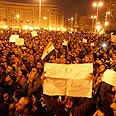
Mubarak won't run for another term
Egyptian president carries speech saying he will not resign but rather 'work for peaceful transition of power' by September. Protesters remain unsatisfied, chanting during speech: 'We will not leave, he will leave'
In a speech aired on state TV Tuesday night, looking calm in suit and tie, he said: "I say in all honesty and regardless of the current situation that I did not intend to nominate myself for a new presidential term. I've spent enough years of my life in the service of Egypt and its people.
"I am now absolutely determined to finish my work for the nation in a way that ensures handing over its safekeeping and banner ... preserving its legitimacy and respecting the constitution ... I will work in the remaining months of my term to take the steps to ensure peaceful transfer of power," he said.
But a group of protesters in Cairo's Tahrir Square chanted slogans against Mubarak during his speech, rejecting his proposals to implement reforms while staying in office. "We will not leave, he will leave," the group chanted.
"Friday afternoon, we will be at the palace," they also shouted, in reference to a march planned and dubbed "The Friday of Departure" aimed at pushing him to quit office immediately.
His appeal to the nation of 80 million seemed designed to reach over the heads of the young, urban dissidents gathered in city centers to the wider population fearful of change and chaos. He accused opponents of being behind looting and disorder in the past week and recalled his military career as a defender of Egypt in war, saying he would not leave the country.
"It won't work. This just really won't work," Elliot Abrams, a former US deputy national security adviser, told CNN.
"I can't see anybody in Tahrir Square accepting that he will be president for eight more months and that he would, after 30 years, be trusted to be the man in charge of the democratic transition. Why would anyone believe that?"
Mubarak has lost the support of key ally the United States, which has pushed hard for him to make way for a democratic handover, at least come September's scheduled presidential election. He also appeared to lose wholehearted backing from the army, which has said protesters' demands are "legitimate".
His statement followed the eighth day of protests in Egypt, which saw more than a million people on the streets calling for his resignation.
In addition, US President Barack Obama's special envoy Frank Wisner delivered a message to Mubarak about the need to prepare for an "orderly transition" of power in the country, a US official said.
Spreading unrest
Mubarak's departure may reconfigure the geopolitical map of the Middle East, with implications from Israel to oil giant Saudi Arabia. Unrest is stirring in other Arab countries like Jordan and Yemen, sending oil prices higher on fears of trouble in Saudi Arabia and on Egypt's Suez Canal.
King Abdullah of Jordan replaced his prime minister on Tuesday following protests. Egypt's opposition, embracing the banned Islamist group the Muslim Brotherhood, Christians, intellectuals and others, began to coalesce around the figure of Mohamed ElBaradei, a Nobel Peace laureate for his work as head of the UN nuclear agency.
ElBaradei said on Tuesday Mubarak must leave Egypt before the reformist opposition would start talks with the government on the future of the Arab world's most populous nation. His supporters spoke of forming a broad-based "board of trustees" to draft constitutional reforms and oversee free elections.
"There can be dialogue but it has to come after the demands of the people are met and the first of those is that President Mubarak leaves," ElBaradei told Al Arabiya television.
Gauging the numbers of protesters was difficult, but most news agencies estimated it hit the million mark that activists had called for. "Mubarak wake up! Today is the last day!" some shouted.
Effigies of Mubarak were hung from traffic lights. The crowds included men, women and children from all walks of life, showing the breadth of opposition to Mubarak.
The demonstration was an emphatic rejection of Mubarak's appointment of a new vice president, Omar Suleiman, a cabinet reshuffle and an offer to open a dialogue with the opposition.
The United States and other Western allies are concerned that Islamists could gain a slice of power should Mubarak be forced out. The prospect of a hostile neighbor on Israel's western border also worries Prime Minister Benjamin Netanyahu.
The hitherto banned Islamist movement the Muslim Brotherhood stayed in the background early in the uprising but is now raising its profile. Analysts say it could do well in any election.
At least 140 people have died since demonstrations began last Tuesday, most in clashes between protesters and police.
AP and Reuters contributed to this report
- Follow Ynetnews on Facebook










